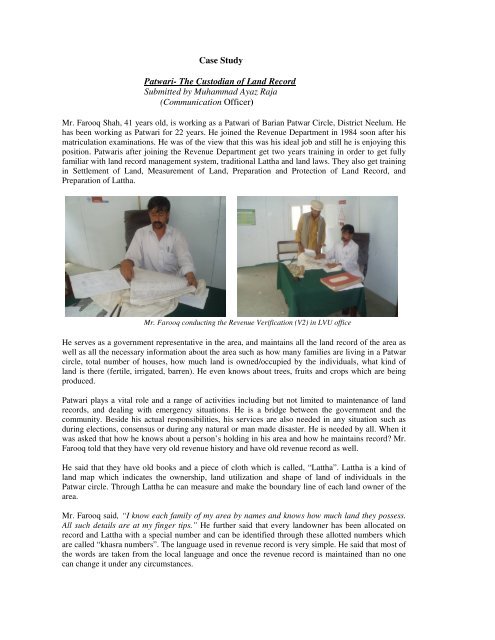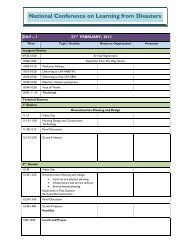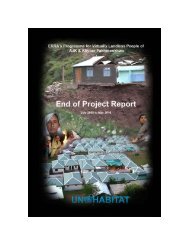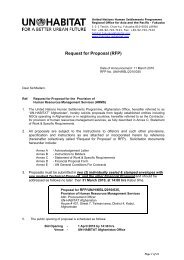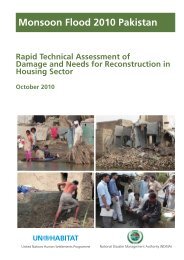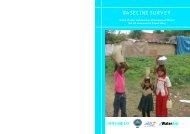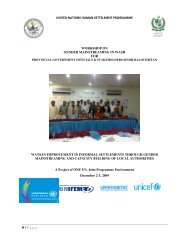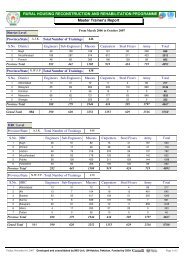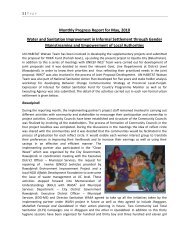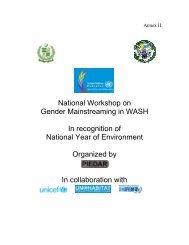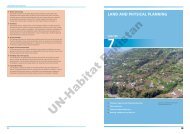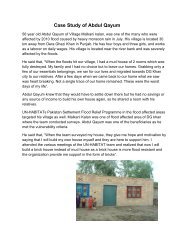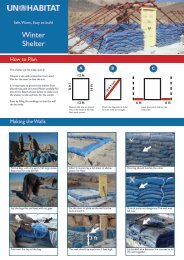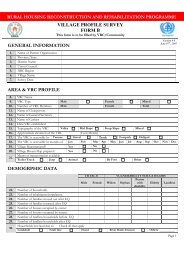Case Study Patwari - UN-HABITAT Pakistan
Case Study Patwari - UN-HABITAT Pakistan
Case Study Patwari - UN-HABITAT Pakistan
- No tags were found...
You also want an ePaper? Increase the reach of your titles
YUMPU automatically turns print PDFs into web optimized ePapers that Google loves.
<strong>Case</strong> <strong>Study</strong><br />
<strong>Patwari</strong>- The Custodian of Land Record<br />
Submitted by Muhammad Ayaz Raja<br />
(Communication Officer)<br />
Mr. Farooq Shah, 41 years old, is working as a <strong>Patwari</strong> of Barian Patwar Circle, District Neelum. He<br />
has been working as <strong>Patwari</strong> for 22 years. He joined the Revenue Department in 1984 soon after his<br />
matriculation examinations. He was of the view that this was his ideal job and still he is enjoying this<br />
position. <strong>Patwari</strong>s after joining the Revenue Department get two years training in order to get fully<br />
familiar with land record management system, traditional Lattha and land laws. They also get training<br />
in Settlement of Land, Measurement of Land, Preparation and Protection of Land Record, and<br />
Preparation of Lattha.<br />
Mr. Farooq conducting the Revenue Verification (V2) in LVU office<br />
He serves as a government representative in the area, and maintains all the land record of the area as<br />
well as all the necessary information about the area such as how many families are living in a Patwar<br />
circle, total number of houses, how much land is owned/occupied by the individuals, what kind of<br />
land is there (fertile, irrigated, barren). He even knows about trees, fruits and crops which are being<br />
produced.<br />
<strong>Patwari</strong> plays a vital role and a range of activities including but not limited to maintenance of land<br />
records, and dealing with emergency situations. He is a bridge between the government and the<br />
community. Beside his actual responsibilities, his services are also needed in any situation such as<br />
during elections, consensus or during any natural or man made disaster. He is needed by all. When it<br />
was asked that how he knows about a person’s holding in his area and how he maintains record Mr.<br />
Farooq told that they have very old revenue history and have old revenue record as well.<br />
He said that they have old books and a piece of cloth which is called, “Lattha”. Lattha is a kind of<br />
land map which indicates the ownership, land utilization and shape of land of individuals in the<br />
Patwar circle. Through Lattha he can measure and make the boundary line of each land owner of the<br />
area.<br />
Mr. Farooq said, “I know each family of my area by names and knows how much land they possess.<br />
All such details are at my finger tips.” He further said that every landowner has been allocated on<br />
record and Lattha with a special number and can be identified through these allotted numbers which<br />
are called “khasra numbers”. The language used in revenue record is very simple. He said that most of<br />
the words are taken from the local language and once the revenue record is maintained than no one<br />
can change it under any circumstances.
Mr. Farooq verifying/identifying the khasra number on Lattha<br />
When it was asked that how much time is needed in land mutation he said, “In normal circumstances<br />
it takes more than two months for getting the ownership of land”. He was asked that how much<br />
amount is needed against taxes on five marlas of land he replied that it depends on the actual cost of<br />
newly purchased land, for instance, if the actual cost of five marlas of land is 75,000 than the buyer<br />
will have to pay 5000 to 7000 to the government.<br />
According to him the <strong>Patwari</strong>es are directly supervised and monitored by the higher authorities.<br />
Therefore, there is no chance of malpractice. He said that most of the time he stays in his area in order<br />
to perform his job. He also appreciated the mechanism of Land Verification Unit (LVU) as well as the<br />
transparency of the system. He said, “One Window Operation is a unique kind of practice and it saves<br />
time as well as money”. Mr. Farooq also appreciated LIMS and emphasized that it should be adopted<br />
by the government for land record keeping.


